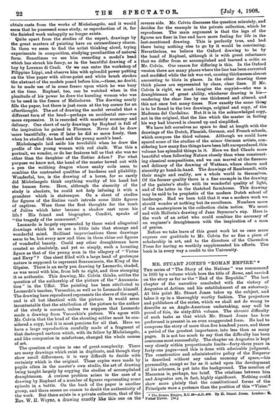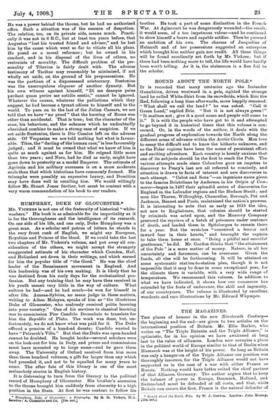MR. STUART JONES'S "ROMAN EMPIRE." *
THE series of "The Story of the Nations" was commenced in 1885 by a volume which bore the title of Borne, and carried on the story as far as the "End of the Republic." The last chapter of the narrative concluded with the victory of Augustus at Actium and his establishment of an autocracy. At this point Mr. Stuart Jones takes up the subject, and takes it up in a thoroughly worthy fashion. The projectora and publishers of the series, which we shall not do wrong to describe as an Anglo-American undertaking, may well be proud of this, its sixty-fifth volume. The chronic difficulty- of such tasks as that which Mr. Stuart Jones has here performed is present in an even exaggerated form. He had to compress the story of more than five hundred years, and these a period of the greatest importance, into less than as many pages. It is not too much to say that the difficulty has been overcome most successfully. The chapter on Augustus is kept very closely within proportionate limits—forty-three years in forty-one pages—and this is done with admirable judgment.. The constructive and administrative policy of the Emperor- is described without any undue economy of space,—his personality, except so- far as it acted upon the development of his schemes, is put into the background. The mention of Macaenas is, perhaps, too brief. The relations between him and Augustus are, in fact, highly significant. Nothing could show more plainly that the constitutional forms of the Principate were a pretence than the position of this "Vizier?'
* The Roman Empire, B.C. 475. By H. Stuart Jones, London ;
Fisher truwia. [58.1
He was a power behind- the throne, but he had no authorised office. Such a a-dilation was of the essence of despotism. The relation, tbo, on its private side, means much. Practi- cally it was not in 8 B.C., but at least ten years before, that Augustus "lost his trusted friend and adviser," and he lost him by the cause which went so far to vitiate all his plans. He posed as a moral reformer; but he owned in his conduct, and in his disposal of the lives of others, no restraints of morality. The difficult problem of the per- sonality of Tiberius is fairly dealt with. The adverse testimony of Tacitus may reasonably be minimised, if not wholly set aside, on the ground of his prepossessions. He was the partisan of a dispossessed aristocracy. Snetonins was the unscrupulous clagueur of another dynasty. But his own witness- against himself, "Di me deaeque peins pordant quam perire me cotidie sentio," cannot be ignored. Whatever the causes, whatever the palliations which they suggest, he had become a tyrant odious to himself and to the world. To pass on to the last of the Julian Caesars, we are told that we have "no proof" that the burning of Rome was other than accidental. That is true ; but the character of the man, his behaviour, and the schemes which he undoubtedly cherished combine to make a strong case• of suspicion. If we set aside Snetonius, there is Dio Cassius left on the adverse aide. Of Vespasian we are told nothing but what is favour- able. Titus, the" darling of the human race," is less favourably judged; and it must be owned that what we know of him is quite as much against as for him. He reigned little more than two years ; and Nero, had he died as early, might have gene down to posterity as a model Emperor. The estimate of Agricola and his military successes is on a More moderate scale than that which historians have commonly formed. His triumphs were possibly an expensive luxury, and Domitian may have' done well in recalling him. We would willingly follow Mr. Stuart Jones further, but must be content with a very warm commendation of his book to our readers.



















































 Previous page
Previous page